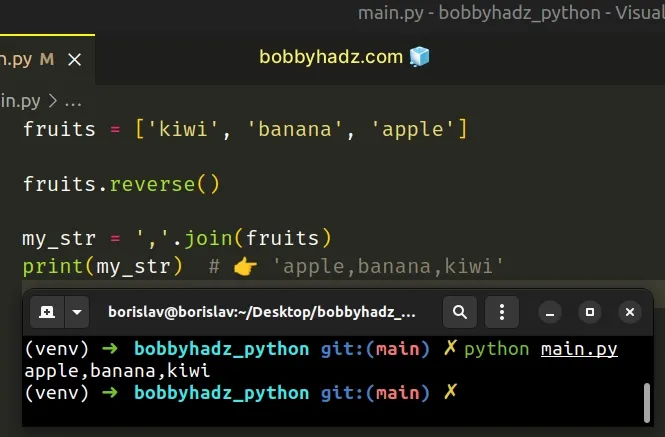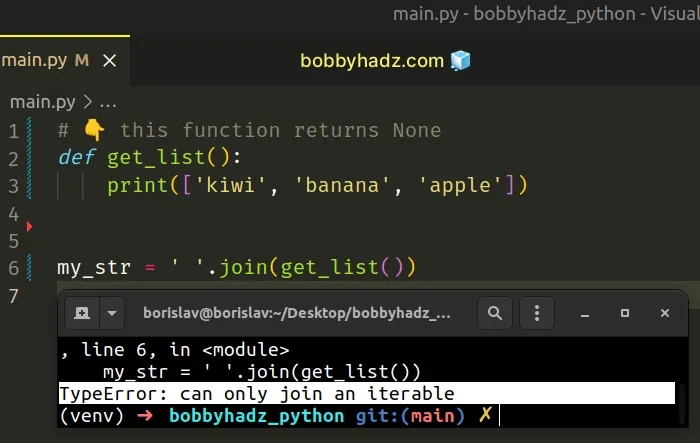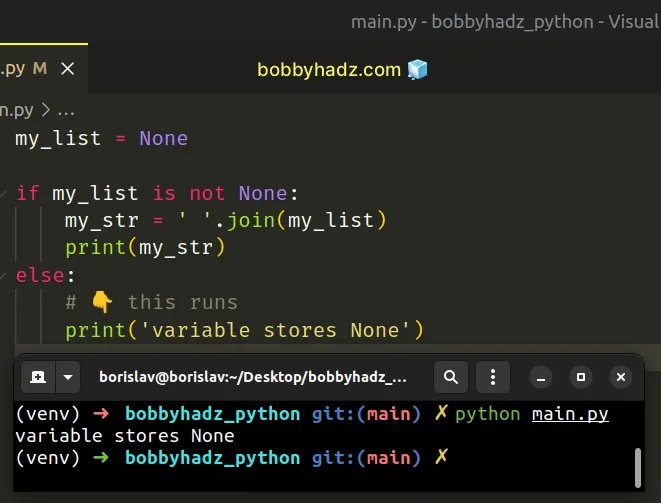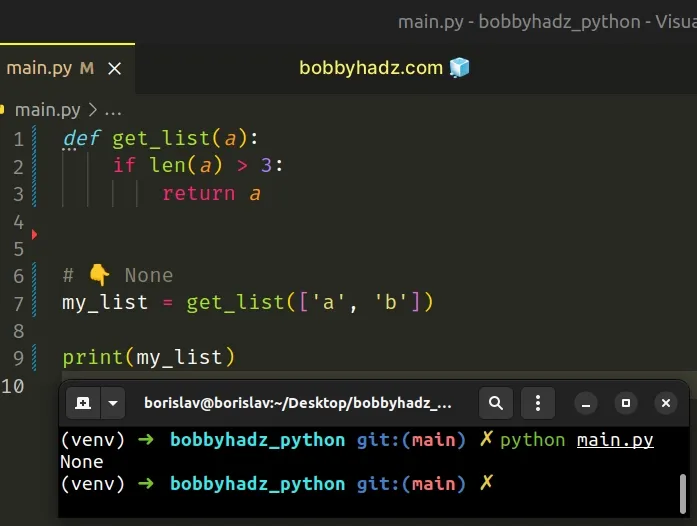TypeError: can only join an iterable in Python [Solved]
Last updated: Apr 8, 2024
Reading time·3 min

# TypeError: can only join an iterable in Python
The Python "TypeError: can only join an iterable" occurs when you pass a
non-iterable value to the str.join() method, e.g. None from calling a
built-in method that doesn't return anything.
To solve the error, make sure to pass an iterable to the join() method.

Here is an example of how the error occurs.
fruits = ['kiwi', 'banana', 'apple'] new_list = fruits.reverse() print(new_list) # 👉️ None # ⛔️ TypeError: can only join an iterable my_str = ','.join(new_list) # 👈️ Passing None to join() print(my_str)
The error is caused because the list.reverse() method mutates the original list in place and doesn't return anything (implicitly returns None).
join() with the result of calling a method (e.g. reverse or sort) or a function that doesn't return anything (returns None).# Make sure to pass an iterable to the str.join() method
To solve the error, we have to make sure to pass an iterable to the str.join()
method, e.g. a list or a tuple.
fruits = ['kiwi', 'banana', 'apple'] fruits.reverse() my_str = ','.join(fruits) print(my_str) # 👉️ 'apple,banana,kiwi'

We passed the actual list to the str.join() method which solved the error.
join() with and make sure it is an iterable.# Most common sources of None in Python
If the value is None, the most common sources of None values are:
- Having a function that doesn't return anything (returns
Noneimplicitly). - Explicitly setting a variable to
None. - Assigning a variable to the result of calling a built-in function that
doesn't return anything (e.g.
reverse,sort, etc). - Having a function that only returns a value if a certain condition is met.
The str.join() method takes an iterable as an argument and returns a string which is the concatenation of the strings in the iterable.
# Functions that don't return anything return None
If the value you are passing to the join() method is None, make sure you
aren't calling it with the result of a function that doesn't return anything.
# 👇️ this function returns None def get_list(): print(['kiwi', 'banana', 'apple']) # ⛔️ TypeError: can only join an iterable my_str = ' '.join(get_list())

You can use a return statement to return a value from a function.
def get_list(): return ['kiwi', 'banana', 'apple'] my_str = ' '.join(get_list()) print(my_str) # 👉️ "kiwi banana apple"
The function now returns a list, so we can safely pass the list to the join()
method.
# Checking if a variable doesn't store None before calling join()
Use an if statement if you need to check
whether a variable doesn't store a None value
before joining it into a string.
my_list = None if my_list is not None: my_str = ' '.join(my_list) print(my_str) else: # 👇️ this runs print('variable stores None')

Alternatively, you can provide an empty list as a fallback.
my_list = None if my_list is None: my_list = [] my_str = ','.join(my_list) print(my_str) # 👉️ ''
sort() or reverse) that mutate the original object in place and return None.Make sure you aren't storing the result of calling one in a variable.
# A function only returning a value if a condition is met
Another common cause of the error is having a function that returns a value only if a condition is met.
def get_list(a): if len(a) > 3: return a # 👇️ None my_list = get_list(['a', 'b'])

The if statement in the get_list function is only run if the passed in
argument has a length greater than 3.
None.To solve the error, you either have to check if the function didn't return
None, or return a default value if the condition is not met.
def get_list(a): if len(a) > 3: return a return [] # 👈️ Return an empty list if the condition is not met # 👇️ [] my_list = get_list(['a', 'b'])
Now the function is guaranteed to return a value regardless of whether the condition is met.

